National Medical Stores at 25
Dec 21, 2018
Innovating for effective, efficient service delivery

NMS at 25: ‘ We have come a long way'
The National Medical Stores (NMS) is celebrating 25 years of dedicated service. Over the years, the organisation has achieved great milestones.
NMS is a statutory corporation that distributes medicines procured by the Government and her development partners, such as USAID, Global Fund, UNICEF, GAVI and World Bank, among others, to all public health facilities in the country.
Moses Kamabare, the general manager and chief executive oficer of the organisation, says NMS has come a long way, which is why its achievements have to be celebrated.
Its growth
Kamabare says NMS' mandate has grown over the years. He says the organisation now serves 100% of government health facilities, including the Police, army and prisons. In August 2012, this mandate was further expanded to distribute all vaccines across the country.
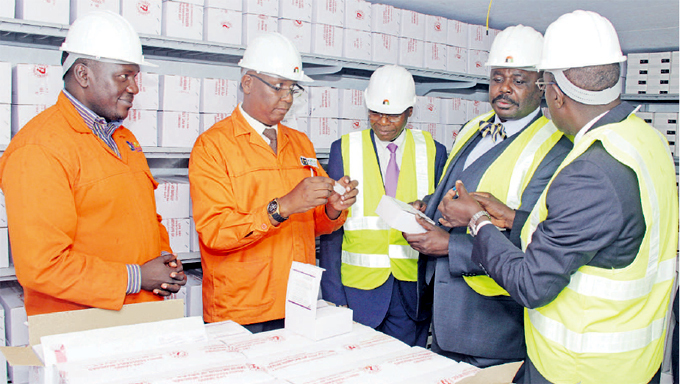 Kamabare (second-right) with Deputy Speaker Jacob Oulanyah and other legislators in one of the organisation's cold rooms
Kamabare (second-right) with Deputy Speaker Jacob Oulanyah and other legislators in one of the organisation's cold roomsHe adds that NMS has enough stock of medicines and vaccines, which it distributes to all government hospitals and health centres on a routine basis, aside from the orders made to the organisation by the health facilities.
"NMS has also opened regional centres as a move to get closer to the people," Kamabare says. The regional ofices are Arua in West Nile; Gulu in the north; Hoima, Kabarole and Fort Portal in the west; and the Kampala regional ofice.
Others are in Mbale, Mbarara, Moroto and Soroti. "We have concentrated on replenishing the regional stores. This has enabled us to become customer-focused at the regional level," he says. CLICK HERE FOR MORE ON THIS STORY
Evolution of National Medical Stores
The National Medical Stores (NMS) is a governmentowned organisation that was established by an Act of Parliament. It is mandated to procure, store and distribute human medication and healthrelated consumable items to government-owned health units in all districts. NMS derives its mandate from the National Medical Stores Act, which came into effect on December 3, 1993. It is supervised by the health minister. Its head ofice is located on Nsamizi Road in Entebbe. It employs over 270 people in different departments.
NMS replaced CMS
The health ministry, through the 1993 NMS Act, delegated the drug supply, storage and distribution of drugs function to NMS, hence the formation of an autonomous institution to replace the Central Medical stores (CMS). NMS was also given the responsibility to ensure the continuous distribution of pharmaceutical products in a inancially viable and sustainable manner. It distributes many drugs which include Uganda Essential Drug Kits, Sexually Transmitted Infections (STI) drugs and family planning products, among others.
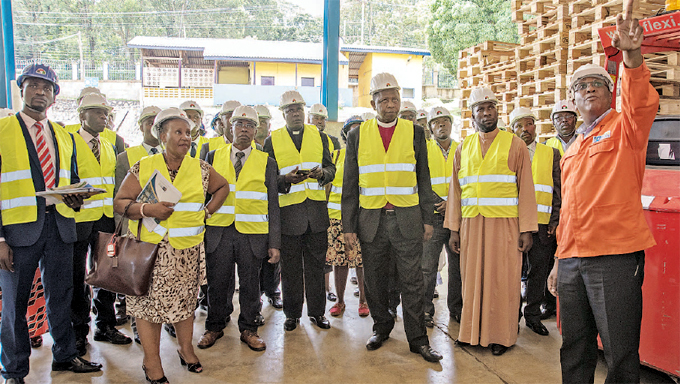 kamabare (right) taking religious leaders around the warehouse in entebbe during the 25 years celebrations recently
kamabare (right) taking religious leaders around the warehouse in entebbe during the 25 years celebrations recently
Mandate expands
NMS' mandate grew to serve 100% of government health facilities including the Police, army and Prisons. In August 2012, this mandate was further expanded to distribute all vaccines across the country. Moses Kamabare, the general manager of the institution, says NMS has enough stock of medicines and vaccines, which it distributes to all government hospitals and health centres on a routine basis, aside the orders made to the organisation by health facilities.
Curbing drug theft
NMS' leadership also came up with the embossment of all medicines to stop theft. "All medicine and medical supplies are embossed with a seal "UG NOT FOR SALE" to ensure that they are not stolen and sold on the open market," Kamabare says. Embossment also helps patients to easily distinguish medicines and medical supplies that they can access free of charge from government health facilities. In the same way, this arrangement helps law enforcement organs such as the Police and courts of law to easily identify Government products for the purpose of charging and convicting suspects brought before them. CLICK HERE FOR MORE ON THIS STORY
NMS destroying expired drugs to save lives
It came as a shock to the public that about 1,500 tonnes of expired drugs were to be destroyed by the National Medical Stores (NMS) in a country facing rampant drug stockouts, leaving many to die due to lack of medicines. However, as explained by the stakeholders, drug expiry is inevitable and if not destroyed, the drugs pose a potential threat to the public, writes PrISca BaIke
Starting early this year, the Ministry of Health has been involved in a drive to collect and dispose of expired drugs and obsolete pharmaceutical from 6,619 health facilities, Government owned and public not for profit.
The process is envisaged to create more space for adequate storage of drugs delivered by the National Medical Stores (NMS) and prevent the risk of public health hazards and relabeling as a result of keeping such items in health facilities for long.
Dr Diana Atwine, the Ministry of Health permanent secretary, says expired pharmaceuticals are a growing concern in the country that can also result into a threat to national security if not disposed properly.
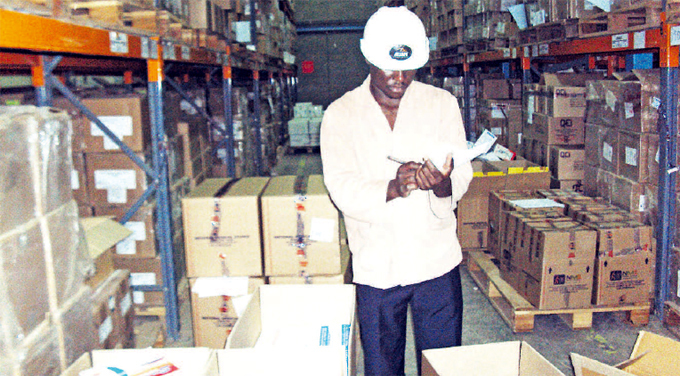 An oficial taking stock of medicine at NMS stores in Entebbe. Expired drugs should be disposed of
An oficial taking stock of medicine at NMS stores in Entebbe. Expired drugs should be disposed of
"It is naturally expected that about 5% of pharmaceuticals in the distribution chain is bound to end up as obsolete or expired," Atwine says, highlighting that the last time such a massive exercise was carried out, was in 2012.
Currently, the estimated quantities of expired medicines all over the country are believed to be about 1,200 to 1,500 tonnes and they are projected to cost sh1b to fully destroy and incinerate them.
Why the predicament?
The most imminent question when it comes to the destruction of expired drugs is why a country that faces rampant drug shortages and deaths related to lack of medicines ends up in such a predicament.
However, as earlier noted by Atwine, it is an anticipated scenario. Moses Kamabare, the chief executive officer of NMS, says drugs will always expire. "This is because NMS procures drugs based on forecasts to prepare for anticipated disease outbreaks," Kamabare says.
He explains that for instance, NMS can procure medicine anticipating that in a few months' time, many parts of the country may suffer from malaria. However, if they do not fall sick, overtime, the drugs will not be used. Consequently, in a few years, they will expire and, therefore, have to be destroyed. CLICK HERE FOR MORE ON THIS STORY
How artificial drug shortages can be checked
After carrying a healthy pregnancy for nine months, Florence Namugga, 24 did the right thing when she went into labour. She went to a health centre four that was, thankfully, less than three kilometres away.
For hours, Namugga was in labour, but not a single health worker examined her. The facility was out of gloves. She was not the only one facing the tough reality of drug and supply stock-out.
Five-year-old Ayub Musoke who had been rushed to hospital, convulsing with malaria did not get any medication, apart from first aid to calm him down. Such are the circumstances that people face every day as the public health facilities are always out of essential medicines and supplies.
Sarah Nabirye, a resident of Bulubandi village in Iganga district, says although their leaders keep reassuring them that there are drugs in the health facilities, she hardly gets any drugs, most of the time.
"Every time I come here or bring my children, the most we get is panadol and malaria tablets once in a while," Nabirye says wondering where the rest of the drugs end up.
There has been a general countrywide concern about people dying of treatable diseases, such as malaria, arising from patients' failure to access drugs in public health facilities, yet drugs worth billions of shillings were reported to have expired in National Medical Stores (NMS) facilities, stores of referral hospitals, district health offices and health units.
Moses Kamabare, the NMS CEO, says most of the drug stock outs are either fake or occasioned by poor planning on the side of the health facility management. He explains that currently, NMS has 20 trailer loads awaiting Uganda Revenue Authority clearance in addition to the massive stocks in their overflowing warehouses.
The challenge, however, is health facilities are not ordering for the drugs, yet people need them. CLICK HERE FOR MORE ON THIS STORY
NMS modern warehouse to ease service delivery
By June 2019, Uganda will have the biggest Government-owned medicine and medical supplies warehouse in the world.
This comes after, National Medical Stores (NMS) put up a modern pharmaceutical and medical equipment warehouse which is about to be completed. Located in Kajjansi on Entebbe Road, the mega facility will also have a spectacular office complex.
When launched, NMS will be in position to handle Uganda's medical demands even if the population increases by ten-fold. According to Moses Kamabare, the general manager and chief executive officer of NMS, the facility will have 32,000 pallet positions and the coldroom capacity shall be over a 1,000 cubic metres.
The capacity is above that of the current warehouse at the NMS headquarters on Nsamizi Road in Entebbe which has 12,900 pallet positions and cold-room capacity of 811 cubic meters.
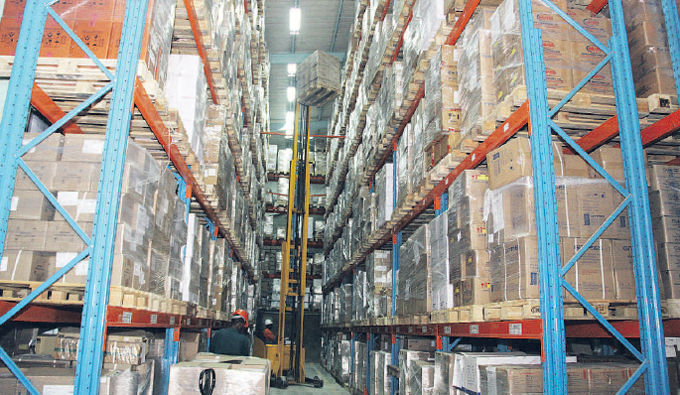 A section of the NMS warehouse in Entebbe
A section of the NMS warehouse in Entebbe
The warehouse is iconic
Paul Okware, the NMS chief stores and operations offi cer, explains that the warehouse will have a vaccine workshop, a quality control laboratory and offi ces for more than 200 staff. It will also have cold storage rooms, garages and space to accommodate 30,000 pallets of medication.
In comparison, the storage in Entebbe can accommodate a maximum of only 12,980 pallets. The facility, which sits on 10 acres of land, will be mounted with solar panels capable of generating 300kv of electricity, providing 50% of the energy needs of the project.
The 69.5b complex shall also include basement parking for 90 cars. Also, a lot of its expectations will be automated and it shall largely be a ‘green' building, because it is designed to let in as much natural light as possible. The building will have solar with an electricity load of 300kva, therefore, promising tremendous savings in energy.
By November, the progress of the project was standing at about 50%, inclusive of design. "We are confi dent that with the quality of work that is being done by the constructor, completion remains on track for 2019," Okware discloses adding that this is in spite of a few challenges. CLICK HERE FOR MORE ON THIS STORY
Technological advancements at National Medical Stores
Gone are the days when stakeholders used to point fingers at each other over failure to supply drugs to the Government health facilities across the country. Today, drug supply can be monitored thanks to the NMS' new system, which allows for online placement of orders and tracking the deliveries.
This comes after the United States Agency for International Development (USAID) gave NMS $3m (sh10.8b) to install new computer software called Enterprise Resource Planning. The IT system enables all stakeholders and interested parties to monitor orders and deliveries.
The managing director, Moses Kamabare, says NMS has often been accused of delayed drug deliveries resulting into shortages at some public health facilities. He adds that most times the delays originate from management of respective public health facilities which do not submit orders on time.
"The software which has been rolled out at all public health facilities countrywide, helps to monitor all orders and deliveries," he affirms. NMS is charged with procuring, storage and distribution of essential medicines and medical supplies to all public health facilities in the country.
With the new IT software, orders are submitted online and all interested parties are able to follow through the process from the time the order is submitted to the time the drugs are delivered to the health facility.
The system has improved service delivery and transparency in the delivery of medical supplies across the country. "This helps in co-ordinating all people who supervise service delivery including MPs, district health officers, resident district commissioners and chief administrative officers. Everyone can check and see where the problem originates in case there is a delay," he explains. CLICK HERE FOR MORE ON THIS STORY
Recentralisation of funds was a win
Although it was a highly criticised move, the recentralisation of funds allocated to drugs and medical supplies, to the National Medical Stores (NMS) has paid off, years after it was enacted.
The decentralisation of funding to health facilities and districts is one of the biggest challenges that NMS had since its inception. Under this system, NMS did not have enough capital, as a result it had to borrow from banks and pay interest, according to Moses Kamabare, the general manager of NMS "It was a dificult time because we were working like a private facility. The Government had to recentralise funding. Now capitalisation is no longer an issue," Kamabare says.
He notes that the move has provided a solution to drug procurement because with the funds allocated to it, NMS is able to procure and deliver medicine to health facilities at a cheaper cost than the health facilities were doing. "It has cut the cost of procurement and delivery of medicine," Kamabare says.
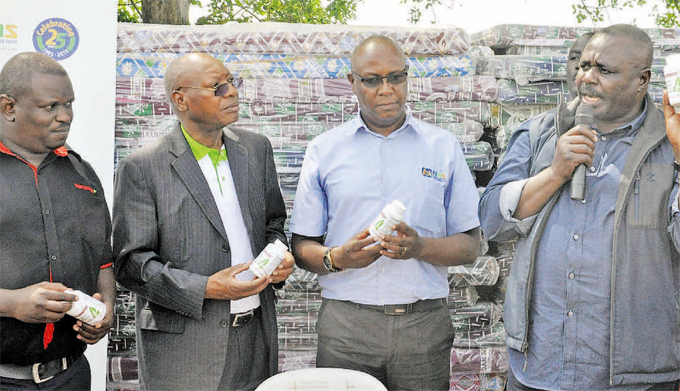 Chairperson of NMS board Dr Jotham Musinguzi (secondleft), Moses Kamabare (second-right) and Jacob Oulanyah (right) with other NMS oficials during the launch of Replenish recently
Chairperson of NMS board Dr Jotham Musinguzi (secondleft), Moses Kamabare (second-right) and Jacob Oulanyah (right) with other NMS oficials during the launch of Replenish recently
He notes that although there was some resistance in the past, the stakeholders appreciate the help that NMS is giving them and they are co-operating with them.
"A few of them maybe quietly resisting but we know they will get on board because there is no way that system is going to change," Kamabare says.
He adds that with their budget allocation, they are able to deliver medicine worth sh1 trillion annually, supplying 100% of public health facilities and private not for proit centres, including army, the Police and prison clinics.
Although the major worry surrounding recentralisation was the distribution of the drugs to the health facilities at the grass roots, NMS has been able to reach all the health facilities, including regional referral hospitals, general hospitals, health centre IVs, IIIs and IIs, through a system called Last Mile Delivery. CLICK HERE FOR MORE ON THIS STORY
NMS donates to children with Nodding Syndrome
As it celebrates 25 years of procuring, storing and distributing essential drugs and supplies for the people of Uganda, National Medical Stores (NMS) is proud to join the ight to curb the effects of Nodding Syndrome amongst those aflicted and affected by the ailment.
Nodding Syndrome is a neurodegenerative condition whose exact cause is yet to be established. Malnutrition plays a signiicant role in making a child susceptible to the illness, and also goes on to make their care dificult once they are affected.
This debilitating ailment affects only children, and has manifested in seven districts in Northern Uganda. And thus NMS, in partnership with the Ugandan irm Doctor's Choice, has acquired and donated three-months stock worth of a new drug supplement called ‘Replenish'.
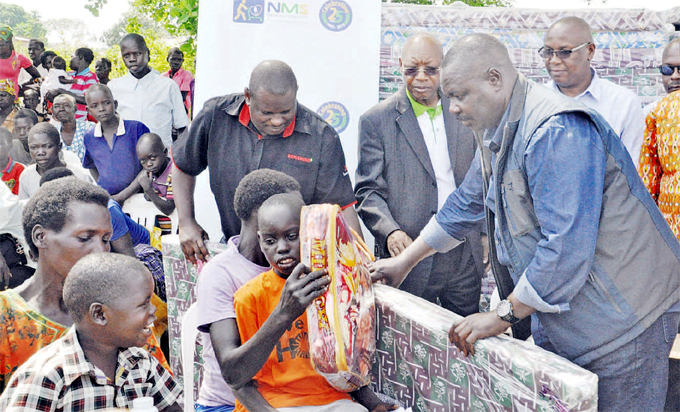 Oulanyah hands over a mattress and blanket to one of the victims
Oulanyah hands over a mattress and blanket to one of the victims
Replenish is a powerful immunebooster, and is specially designed to counter the deiciencies of selenium and Vitamin B6 that are seen in the sufferers of Nodding Syndrome.
The drug has been certiied by the National Drug Authority. The global launch of Replenish occurred at Hope for Humans Care Center in Odek sub-county, Omoro district, on November8.
The Chief Guest was the Deputy Speaker and member of parliament for Omoro district, Jacob Oulanyah. He thanked NMS for going a step above their usual mandate and directing energy towards providing care and generating awareness about the ailment.
NMS also donated 200 mattresses and 200 blankets, cups, plates and food stuff to the children suffering from nodding disease through the Hope for Humans nodding disease treatment centre. While handing over the items, Oulanyah said the items would ease the living conditions of the victims. CLICK HERE FOR MORE ON THIS STORY
Celebrating 25 years of NMS service
In celebration of hitting 25 years of successful national service, National Medical Stores (NMS) organised a three-day event during which groups of stakeholders were engaged.
This took place at the NMS headquarters on Nsamizi Road in Entebbe municipality, Wakiso district. The groups included women and youth leaders, members of the medical and pharmaceutical fraternity and religious leaders from different denominations.
On the first day on December 10, over 150 women and youth leaders spent the day at the NMS headquarters engaging in different activities. The next day, members of the medical and pharmaceutical fraternity were invited. The religious leaders wrapped up the celebrations on December 12.
They were led by the Archbishop of the Church of Uganda, His Grace Stanley Ntagali, who was the chief guest and celebrant. All stakeholder groups were addressed by the general manager of NMS, Moses Kamabare.
They later engaged in question and answer discussions that helped NMS assess the milestones they have achieved in over 25 years of existence and service.
The groups were then given a tour of the warehouses and cold rooms. Other activities included an on-sight health camp, where the staff and the guests got the opportunity to find out their HIV status and vitals, coupled with an opportunity to donate blood.
Less pharmacists
While at the event, Dr Ekwaro Obuku, the chairperson of the Uganda Medical Association, implored the Government to put in place provisions that allow for recruitment of more pharmacists in public health centres.
He noted that there are only 45 pharmacists employed by the Government, in different regions of the country, yet the country has over 1,000 pharmacists and more are still graduating. "Most of the pharmacists are employed in the private sector because they are not provided for in the public sector," he remarked.
Prof. John Charles Okiria, the chairperson of the Allied Health Professionals Council, was quick to add that the provision of pharmacists in public sector remains at a regional level. CLICK HERE FOR MORE ON THIS STORY
How NMS has overcome challenges over the years
The 25 years journey of National Medical Stores (NMS) has been successful being decorated with great milestones. However, according to Moses Kamabare, general manager of the Government-owned organisation, they have faced challenges along the way as discussed below.
Poor quantification of needs
There has been continuous poor quantifi cation of drug needs and non-adherence to procurement plans during ordering by high level health facilities. For the lower health facilities, Kamabare says the biggest challenge is the elastic nature of upgrading of facilities.
"To curb this challenge, the health ministry has advised districts not to construct new or upgrade facilities without co-ordinating with them for better service delivery," he says. He adds that there is also need to align cycle orders with procurements plans for the high level health facilities.
Funding gaps
Kamabare says there are funding gaps for key drugs like ARVs. The stakeholders and funders do not cover 100% of the need. ARVs purchase is funded by the Government of Uganda, Global Fund and PEPFAR. Presently, the public sector is catering for 65% of the patients facing funding gaps. "There is need for increased funding for ARVs, test kits and laboratory supplies," he emphasizes.
Kamabare adds that overall, the funds NMS receives from the Government are not enough to cater for the needs of all Ugandans. For example, last fi nancial year NMS received sh250b, but when you look at the value of the medicine that went through NMS to the individual facilities, it was actually more than sh900b.
"Therefore, the difference is the value of medicine and medical supplies that we get from development partners. We must do well because our partners may lose confi dence in our system and withhold the supplies that they give us,'' Kamabare says.
He adds that Uganda's tax base has not been able to support the rapid growth of the population and the funds received directly from the Government have not been enough to take care of all the needs.
That is why the Government has decided to run to development partners to bridge the gap between what is needed and what the Government can give. In case the tax base improves, the Government will be in position to take care of its people. CLICK HERE FOR MORE STORY
PICTORIAL
NATIONAL MEDICAL STORES EXHIBITS 25 YEARS OF OPERATIONAL EXCELLENCE TO STAKEHOLDERS
ADVERTS
PRECISE DIAGNOSTIC AND MEDICAL SUPPLIES LIMITED
